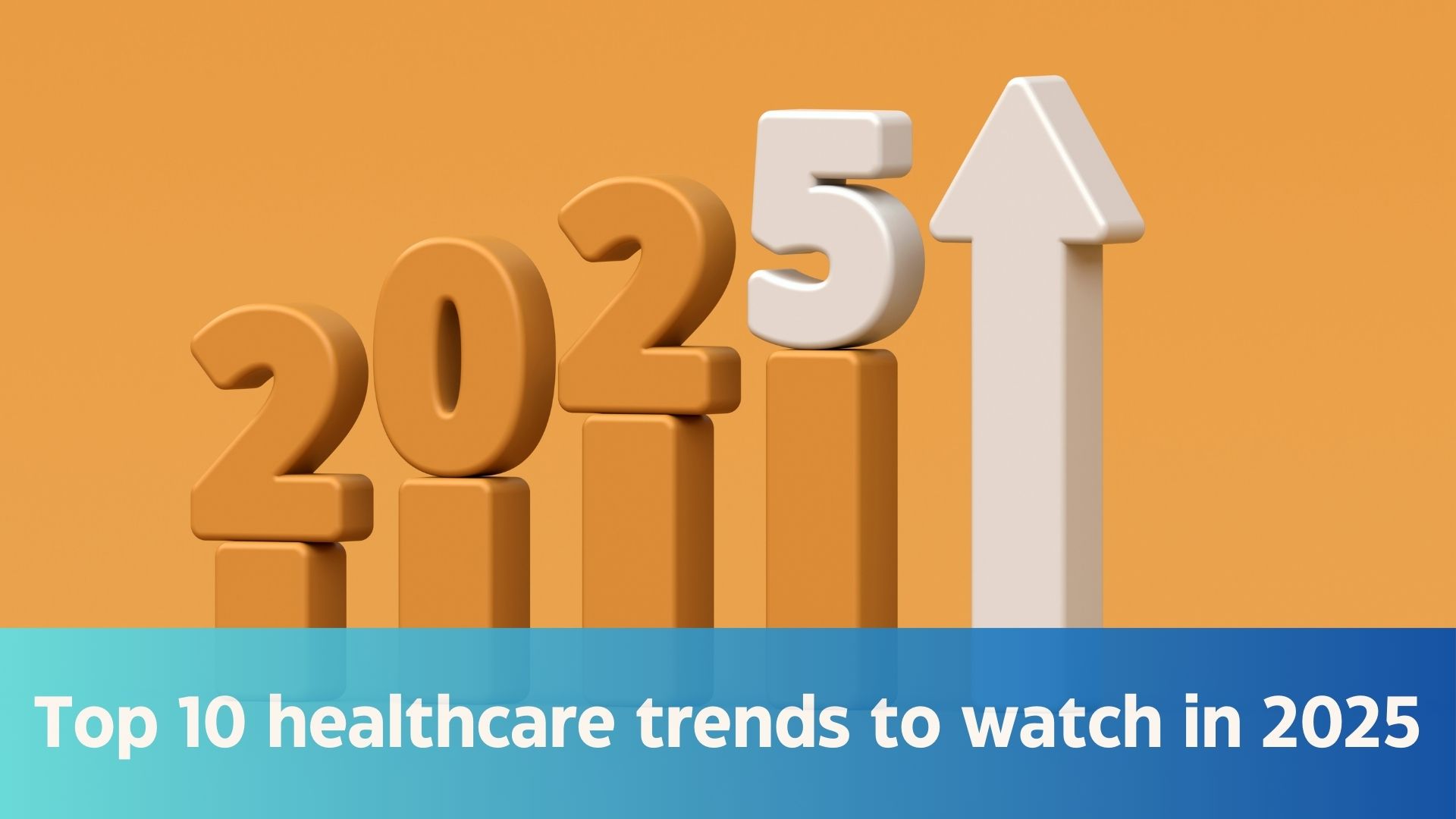Introduction
The healthcare industry has been experiencing revolutionary technological innovations in recent years. Healthcare facilities deploy the latest and advanced technology to improve operational efficiency and explore diverse growth opportunities. And this change is going on non-stop. Healthcare Trends 2025 is no exception. The healthcare industry passes through constant changes. This relentless wave of innovations and advancements addresses the challenges that have emerged due to demographic and societal factors. This trajectory will continue in 2025, as remote medicine, advancements in AI, and biotechnology provide valuable assistance to healthcare planning and delivery.
From a broader perspective, we’ll continue to experience a similar shift toward predictive measures as systems adapt to cope with population booms, aging demographics, and financial challenges caused by economic uncertainty.
So, here in this blog we will talk about the major changes that I believe will greatly impact healthcare trends 2025.
The Personalized Healthcare Revolution
In 2025, personalized healthcare means more than just precision medicine – it’s about deploying AI and data to make thorough assessments of the unique needs of every patient. Think tailored communication strategies and wellness plans aimed at facilitating hard-to-reach demographic groups to engage with physicians. This personalized treatment efficiently provided to patients will push health provision away from reactive to preventive measures – significantly reducing society’s treatment cost while also improving patient outcomes, leading to a win-win scenario.
Future-Proofing Healthcare
AI in healthcare will continue to transform the strategies that healthcare systems devise to navigate large-scale challenges, starting from future pandemics to health-related crises caused by famine, war, and climate change. Healthcare providers will have more tools and data at their fingertips in 2025 than ever before, and it will be largely essential for them to have a profound understanding of the global trends that impact human health. This will require healthcare providers to prioritize addressing the challenges regarding the aging populations in developed countries, and the increasing healthcare demands of growing populations in developing parts of the world.
Technology in Mental Wellness
Advancements in technological solutions will positively impact the delivery of mental healthcare services. These technologically innovative solutions will facilitate virtual healthcare sessions delivered remotely in an AR or VR environment by human therapists. In addition to that, we will also share the growing trend of using chatbots that can be utilized for instantaneous 24/7 support. These expertly designed technology-oriented facilitations will help mental healthcare service providers achieve their professional objectives and overcome several challenges more conveniently. Given the healthcare providers taking up the healthcare industry as their top priority, the use of AI in the healthcare industry will continue to expand, enabling more timely interventions and greater accessibility.
Wearables 2.0-BCIs And Implants
A new discussion that is likely to become a hotly debated topic in 2025 involving the role of AI in the health industry is brain-computer interfaces (BCIs). It represents the next generation of wearable health-tech devices. You will witness lots of discussions around the topic even if you are not quite ready to start plugging chips into your cerebral cortex. There will be lots of speculation, hype, excitement, and discussion about it. This technology promises to solve several challenges that the healthcare industry currently faces, negatively impacting the lives of millions of people around the globe. However, it raises lots of questions regarding ethics such as who owns the data that our brain generates.
Decoding the Secrets of Life with Genomics
One of the most exciting and challenging areas of healthcare innovation in 2025 is genomics and gene editing. Technologies like CRISPR are increasingly transitioning from laboratory to real-world clinical applications that enable the development of specified treatments for many genetic conditions, such as muscular dystrophy, Huntigton’s disease, and cystic fibrosis which were once thought incurable. In 2025, there will be extensive research into its applications for cardiovascular and cancer disease, thanks to the ability of this breakthrough technology to bring about the positive transformation that treats these life-threatening conditions at a molecular level.
The Health Data Dilemma
The revolution in the volume of health data such as medical records, genomic information, and data collected from wearables is leading to rapid advances in the science of healthcare. However, it’s a double-edged sword that also has a dark side. The more we allow agencies and organizations to have access to our highly sensitive and valuable information, the greater the risk of our data being misused or stolen. Our health-related data is a largely valuable target for cybercriminals and can cause lots of problems if it falls into the wrong hands. The harmful activities it could be used include identity theft and future issues that cannot be even foreseen tomorrow. Above all, financial risk alone should be one of the major reasons prompting the healthcare industry to take immediate action. According to WEF, it is the healthcare industry that pays the highest price for any sector for cyber-attacks, with the average breach costing almost $11 million. Cyber resilience and developing strategies to secure our information and protect society from this looming threat will be a critical priority regarding digital health trends in 2025.
Healthcare’s Tech Skills Crisis Resolved
Skilled people are pivotal for any technological breakthrough, without having enough skilled people, the potential for AI, precision-targeted diagnoses, and drug discovery will not materialize. A recent survey into the challenges of digital transformation in healthcare found that lack of specific skills and talent are the biggest obstacles to benefitting from diverse growth opportunities created by new technology. In 2025, we will witness how healthcare providers try to tackle it by investing in reskilling, training, and partnering with the tech industry. All of this will be essential if the massive benefits of biotechnology and AI are to be realized.
In 2025, the healthcare industry is passing through a largely pivotal moment of transformation, where technological innovation offers numerous opportunities to improve healthcare delivery and patient outcomes. However, the success of these wonderful advancements including brain-computer interfaces and personalized medicine, etc., largely depends on our ability to address complicated challenges around data security, growing skills gap, and ethical considerations. Technological companies, healthcare providers, and educational institutions must collaborate to build a workforce capable of implementing these innovations effectively and safely. The future of the healthcare industry doesn’t only depend on developing new technologies but creating a sustainable ecosystem where security, innovation, and human expertise work in harmony to set the best healthcare technology trends and deliver better healthcare for all.
FAQs
How is Telemedicine Growth impacting access to healthcare?
Telemedicine Growth is making healthcare more accessible by allowing patients to consult doctors remotely, reducing travel time, and reaching underserved or rural areas more efficiently.
What’s the No. 1 digital health trend set to dominate 2025?
Expect AI-powered diagnostics to lead the way—revolutionizing how diseases are detected, often faster than traditional methods. But that’s just the beginning of a much bigger digital transformation.
Could wearable tech go beyond tracking steps in 2025?
Yes—and in surprising ways. Think Wearables 2.0, with brain-computer interfaces and health-monitoring implants offering real-time insights you never thought possible.
Is virtual healthcare here to stay or just a passing phase?
With the explosive Telemedicine Growth and evolving remote patient monitoring, virtual care is becoming the new normal—only smarter, faster, and more personalized than ever before.
Will personalized medicine finally become mainstream in 2025?
Absolutely. Thanks to genomics and precision medicine, treatments will be tailored to your DNA—offering better outcomes and fewer side effects. The era of one-size-fits-all is fading fast.
What futuristic trend is quietly reshaping healthcare behind the scenes?
Keep an eye on predictive analytics and healthcare data interoperability—they’re unlocking hidden patterns, preventing diseases before they start, and could redefine how care is delivered globally.
How is Pro Medical Billing Solutions aligned with the Top 10 Healthcare Trends to Watch in 2025?
Pro Medical Billing Solutions is ahead of the curve—leveraging cutting-edge AI tools, automated workflows, and a team of highly skilled, industry-seasoned experts to streamline revenue cycles, reduce claim denials, and empower providers to focus on patient care. We’re not just following trends—we’re setting them.



